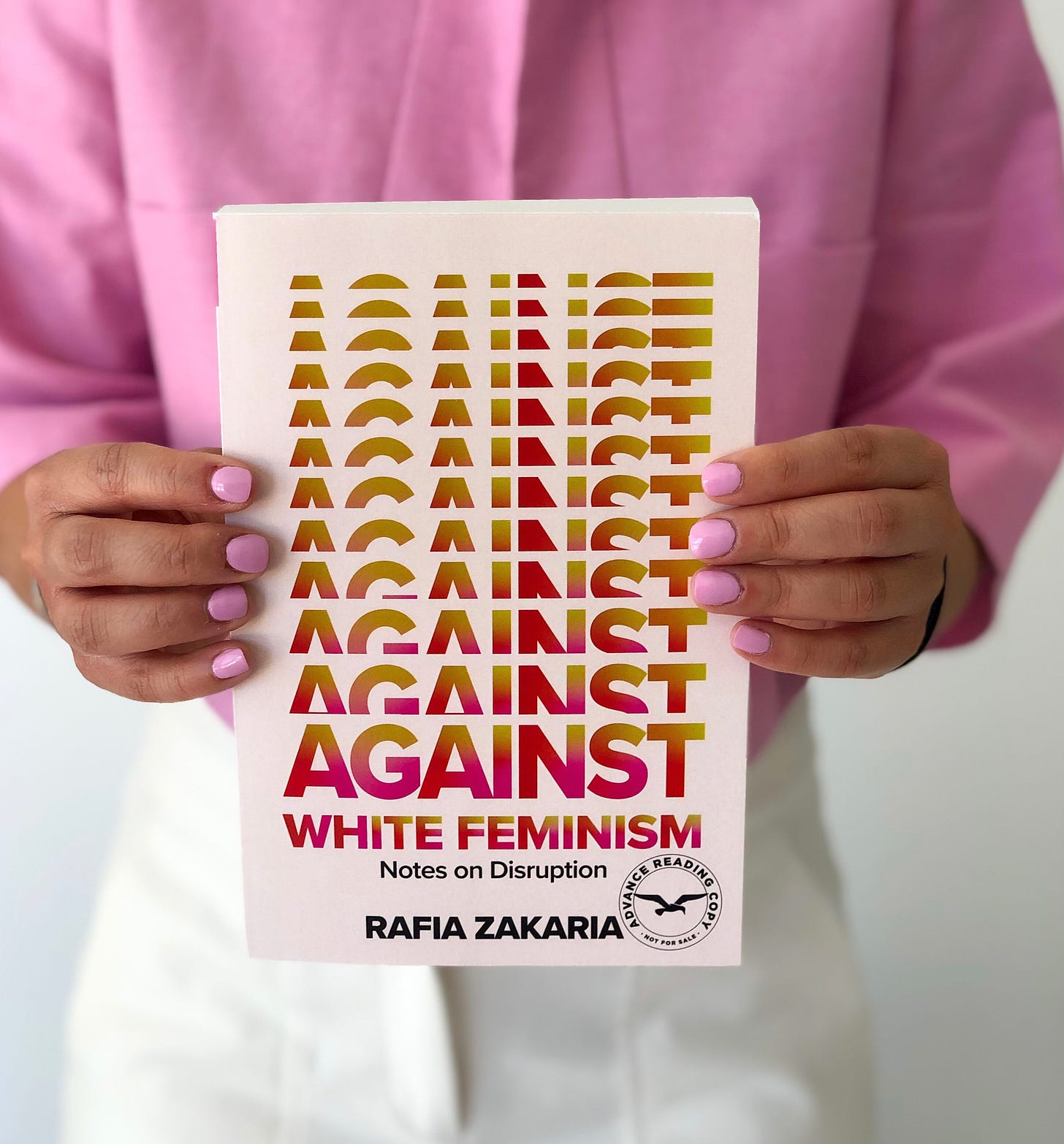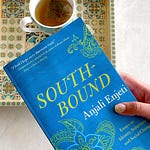Dear readers,
Autumn reminds us that our bodies, minds, and surroundings are always developing. As a result, this season, we're focusing on books that expand our perceptions. Rafia Zakaria fiercely does that. In this special edition of our newsletter, we interview the author of our Fall BGB Book of the Season: "Against White Feminism." We hope this book, and Zakaria's thoughts below, allow you space for reflection - ideally with a warm cup of cider in hand.
Until next time,
Mishika and Sri
Rafia Zakaria is an attorney and a regular contributor to many digital publications including the Guardian and CNN. She is also the author of “The Upstairs Wife: An Intimate History of Pakistan,” “Veil,” and “Against White Feminism.”
🎧 Listen to our discussion with Rafia above.
(0:39) Can you describe white feminism and feminism as it should be?
We went around thinking about whether we should have "white feminism" in the title of the book. Ultimately, I decided in favor of it because that is really what the book is about. I don't mean white feminism as a racial, descriptive category. So, I'm not talking about white women who are white feminists. I'm talking very particularly about women who are invested in whiteness as a form of racial privilege. In practical terms, this means women who are unwilling to acknowledge, reflect upon, or work to eliminate the policies, structures, and ideas within feminism that are connected to white supremacy. This book is trying to give people a feminist vocabulary to talk about the impact of historical white privilege within our movement. And then also look at the contemporary iterations of that. My hope is that if we are able to do that, we can actually have a viable movement that is egalitarian and diverse.
(4:15) While your book contains academic and journalistic research, you also integrate your personal experiences into your writing. What moments, either personal or discovered through research, led to your feminist awakening and how did your feminism evolve while writing "Against White Feminism"?
When people see a brown woman, a Black woman, or an Asian woman who is successful, they think, "You're successful. So, how bad can society be? How racist can it be?" I wanted readers to have an idea of the hurdles, disappointments, and inexplicable exclusions that brown, or women of color, face. I wanted people to understand that I was working against a system that was not designed for me.
I had been making the arguments in this book for years in different forms, but not in book form. When I first wanted to publish this book, my agent at the time, who was a white man, said, "no, absolutely not. This is never going to be a book." But, I'm tremendously proud of this book, more than my other books, because it was almost an impossible book.
Brown people are in an intermediate category - we're not Black and we're not white. While it is 100% true that Black people have fought incredibly difficult battles that allow women like me to speak, it is also true that brown, Asian, etc. people have something to contribute to the discussion that's quite original and worthy.
(16:10) In your chapter "White Feminists and Feminist Wars", you argue that white feminists have been front and center in the War on Terror. As an example, you highlight tactics deployed by white women in reporting on Middle East and Muslim women. What has been your reaction to U.S. news coverage in Afghanistan in the present day?
Firstly, I didn't expect that the withdrawal would be literally happening the week that the book came out. But, aside from that, I was just full of despair at the coverage. I know there is not going to be a reckoning among white women where they look at coverage they've done on Muslim countries and admit to using cultural ideals of sisterhood to gain access to women. What really disappointed me was, for instance, the re-emergence of the burqa, the central issue in avant feminism. American journalist Clarissa Ward - and this is not a personal criticism aimed at her - is standing in Kabul and putting on the burqa and taking it off. It's all theater. I was talking to a woman's activist in Kabul, and she said she was so enraged when she saw that because, at the time, the Taliban hadn't said a word about wearing the burqa. And then, suddenly, a pack of white women journalists are going around doing this, not just Clarissa. And she said, "you know, they're making life hard for me because now that they [the Taliban] see that this is what the West expects, they're going to do it." There is the complete inability to see the complexity of the vale when white women take the lead in talking about gender.
(22:14) While on this subject, how can journalists support the women in Afghanistan without misrepresenting their stories and exploiting their resources?
I don't know what it will take to make white women understand that having a random white woman from the United States represent the whole country is on its face considered absurd. It's the same with Afghan women. They have a lot of diversity of opinions, interests, and political loyalties. I know Afghan women who vocalize their personal views, but that is not highlighted enough.
(24:30) Have you heard from white feminists after the release of your book? At what point do you walk away from readers that disagree with your POV versus engage with their arguments?
There are people who don't like the book or oppose the book in the United States. But it is all within the realm of good discussion. Surprisingly, there was more pushback in the UK. The UK audience is much more uncomfortable around this vocabulary of racial privilege, whiteness, and structural inequality. There is also a huge class of brown people in the UK. who have been able to collect the scraps from white people and get some economic upward mobility on the idea that they're better than Black people.
Transphobia is another issue. 100% of the women who wrote critically about "Against White Feminism" believe in essentialism within gender. I'm pro-trans obviously, I don't think anybody should be discriminated against. It was a weird combination of white supremacist condescension coupled with transphobia. I asked one of them on Twitter, "are you a white supremacist?" And they responded "yes." I don't really know where to go after that. This is a politically acceptable position to have in the UK. The discourse in the UK seems to be much older - people who are used to dominating the public sphere and are venomous to anyone asking to cede space. I see a lot of hope in Gen Z in the U.S., because they seem to understand what we're trying to do here.
(35:20) We believe "Against White Feminism" is destined for every "must-read feminist" list. What are books that you'd like to see on this list with you?
If you want to learn more about Muslim feminism, I'd recommend Fatema Mernissi. Nawal El Saadawi, an Egyptian feminist, critiques the United Nations and white-led transnational NGOs. In terms of the subcontinent, there's nobody better than Ismat Chughtai. She was a fiction writer, but such a strong and courageous one. Her book "The Crooked Line" is available in the U.S. in English. More recently, of course, I think "Hood Feminism" by Mikki Kendall and “White Tears/Brown Scars: How White Feminism Betrays Women of Color" by Ruby Hamad is excellent. If you want to go deeper, for instance, on how Muslim feminists are reinterpreting Islamic law, you can read Asifa Quraishi-Landes' work.
A fun book to read is Ruby Lal's "Nur Jahan." It makes the point that strong women have existed around the world, but we've created a movement that's just centered on white people and whiteness. There were brown women in India, fighting against British soldiers, administrators, judges, etc., but there are huge gaps in our history.
Zakaria's work is destined for every "must-read feminist" list for its searing truth and organized research. Despite the hard-hitting title, Zakaria's thesis is inclusive: eliminating white feminism cannot be equated to dismissing white women from feminism; rather, we must collectively remove centuries of white supremacy and capitalism from the common spaces of feminism to enable Black and brown voices to equally participate in the movement.
Where Mikki Kendall's "Hood Feminism" fell short of historical and contemporary examples, Zakaria's work includes an overflowing amount of studies. The insertion of her personal experiences - moving from Pakistan to the U.S., escaping an abusive marriage, and witnessing inequalities as an attorney at a majority-minority firm - will, I hope, allow readers to not simply observe her zeal but buy into her words too.
Order your copy of “Against White Feminism.”










Against White Feminism